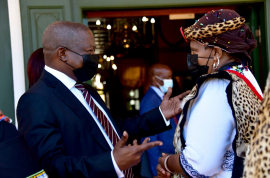
President Cyril Ramaphosa has established an Inter-Ministerial Task Team to respond to issues raised over the years by traditional leaders.
This was revealed by Deputy President David Mabuza when addressing the official opening of the National House of Traditional and Khoi-San Leaders on Thursday.
He said the task team will endeavour to address all the issues raised by the institution of traditional and Khoi-San leaders over the years, in order to advance development in their respective communities.
The task team is chaired by the Deputy President and comprises the Ministers of Cooperative Governance and Traditional Affairs; Agriculture, Land Reform and Rural Development; Public Works and Infrastructure; Police; Mineral Resources and Energy; Finance; Health; Sport, Arts and Culture, and Justice and Correctional Services.
“While we concede that some of the issues you have raised have taken long to deal with and resolve, we reaffirm government’s commitment to prioritising these issues...
“At the apex of government, we can assure you that the commitment is unwavering,” he said in his address at the Good Hope Chamber in Parliament, Cape Town.
While Mabuza acknowledged that some of the issues have taken long to resolve, he said government is confident that the process it has chosen will bear fruit.
“That is why we appeal to all sections of this institution to afford the unfolding process space and an opportunity to work on the issues at hand.
“In taking some of these issues forward, the task team will utilise available instruments, including the District Development Model, as an appropriate implementation tool for investment in rural areas.
“We believe that each of our communities has a unique set of endowments which, if unlocked, can lead to sustainable and shared growth for those communities. Our ability to realise development in society requires partnership with institutions of traditional and Khoi-San leadership as agencies of the people. At a policy level, we continue to implement enabling legislation for the benefit of this institution.”
Traditional and Khoi-San Leadership Act
Mabuza said the Traditional and Khoi-San Leadership Act, which provides for traditional councils to be constituted, has come into effect as indicated last year, which has been a matter of concern to the institution.
The Minister of Cooperative Governance and Traditional Affairs has gazetted a formula for constituting traditional councils, which will pave the way for the election and appointment of members.
“We look forward to the Minister and the members of the Provincial Executive Councils responsible for Traditional Affairs providing the necessary infrastructure, logistical and capacity enhancement needs of these Councils,” the Deputy President said.
Commission on Khoi-San Matters
The Commission on Khoi-San Matters, which is meant to facilitate the recognition of qualifying Khoi-San leaders, was established in September 2021.
Mabuza congratulated Professor Nico Botha on his appointment as the Chairperson of the Commission and Douglas Bennet as the Deputy Chairperson.
“Commissioners Botha and Bennet, together with the team, bring a wealth of knowledge and experience on the history, culture and heritage of these important Khoi-San communities, which have been obscure for far too long.
“Because we are a nation that understands that our past is an important feature in moulding our shared future. We pledge to provide all the support necessary to the Commission as it undertakes the important and ground-breaking work, which includes documenting this history and the consideration of applications for the recognition of Khoi-San leaders.”
The Deputy President said through such recognition, Khoi-San leaders will for the first time in history, formally take up their positions to lead their respective communities.
“As we practice our cultures and traditions, we must seek at all times to protect the inalienable right to life and dignity, for such rights cannot be limited or suspended under any circumstances.”
Initiation deaths
Mabuza further emphasised that government remains concerned about the continued deaths of young people who participate in customary initiation, particularly in the Eastern Cape.
He said customary initiation should serve as a rite of passage for young people, and as such, it is a practice that should embrace evolving methods of modern science to prevent any loss of life.
“The Customary Initiation Act, which came into effect in September 2021, will assist in improving the situation and promote safe initiation practices in our communities.
“We also call upon parents who send their children to initiation schools to ensure that such schools are registered.”
Part of the ongoing dialogue with the houses and leaders of institutions of traditional and Khoi-San leadership is how they can use these schools to shape young boys into agents of change to combat gender-based violence and femicide.
“We believe that the programme is very critical to ensuring that the boy-child is raised respecting and protecting women. The Traditional Men’s Parliament, which is led by the National House, also remains critical in the advancement of moral regeneration initiatives,” he said. –SAnews.gov.za


